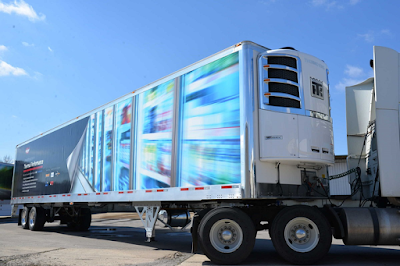Refrigerated Trucks Haul More Than Just Perishables
It may come as a surprise that “perishable goods” include items more diverse than fresh fruits and vegetables, meats, frozen foods, and dairy products. Today’s truck and trailer refrigeration systems, known as reefers, also keep other high-value loads at ideal temperatures and humidity levels so they arrive safely at their final destinations.
Prompted by regulations and economics, the cold chain has broadened. More loads than ever require climate-controlled handling, including:
- Pharmaceuticals. Commonly used drugs such as insulin and the seasonal flu vaccine must be shipped and stored at temperatures between 35˚F and 46˚F to prevent spoilage and contamination.
- Tobacco products. Cigarettes, cigars, and other high-value tobacco items require strictly controlled temperature levels to preserve freshness and quality.
- Fine art and antiques. Controlling humidity and temperature is vital for shipments of art, antiques, collectible vehicles, and other valuable items. These items often travel long distances in a controlled climate of about 70˚F.
- Personal care products. Cosmetics, perfumes, and other personal care products must be protected against the possibility of spoilage during the journey from factory to warehouse to store. Lipstick, for example, can easily melt unless proper trailer temperatures are maintained.
- Chemicals and engineered materials. Climate control helps reduce the chance of a chemical reaction that could result in a fire or explosion, or affect the load’s quality.
Keeping Cool
Today’s fleet operators have technology to thank for transportation refrigeration systems that are more efficient, reliable, and flexible than those built even one decade ago. For example, today’s refrigeration systems enable fleet managers to precisely set the temperature, airflow, and operating mode that are most appropriate for the load they are carrying.Fleet managers can improve load safety and security by installing redundant refrigeration systems that ensure optimum environmental conditions are maintained, even if the primary refrigeration unit fails. Other advancements include ultrasonic fuel sensor technology, which provides timely, accurate information on refrigeration unit fuel levels.
Control system innovations, including smart reefer controls, enable fleet managers to monitor truck and trailer fleets remotely from a central location. Using cellular communication technologies, fleet managers are able to monitor environmental conditions inside every trailer in the fleet simultaneously to ensure that prescribed load conditions are being maintained.
Load safety and security can also be improved through technologies such as geo fencing, which alerts the driver and fleet manager if a truck or trailer is moved outside a prescribed area before its scheduled departure time.
In addition, today’s refrigeration trucks are more energy-efficient and environmentally responsible than ever. Most use non-ozone-depleting refrigerants and run on a five-percent biodiesel blend. They are estimated to be 85 percent quieter and 10 to 20 percent more fuel-efficient than previous units.
Thanks to these technologies, shippers know their temperature-sensitive loads will arrive in perfect condition.




Load safety and security can also be improved through technologies such as geo fencing, which alerts the driver and fleet manager. refrigerated van for sale near me
ReplyDelete